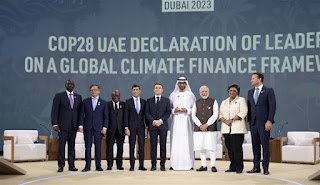CLIMATE ACTION: A PROMISE EASIER TO BE MADE THAN KEPT
Nikunja Bihari Sahu
As temperatures around the world have
been soaring to unprecedented levels unleashing a flurry of climate-related
disasters like wildfires, flash floods, intensifying cyclones and many more,
the COP 28 climate summit in Dubai concluded with many positive outcomes. In a
historic and comprehensive document called the UAE consensus, around 70,000
delegates from 198 stakeholder countries joined together to identify for the
first time that fossil fuels were indeed the major culprit for the current
climate crisis and called for a transition away from the fossil fuels in an
orderly, just and equitable manner with a goal to achieve the net zero status
by 2050. This is despite the initial hesitation from some oil-producing
countries including the UAE itself with the President of the Summit, Sultan
Ahmed Al-Jaber, reportedly voicing concern over the scientific rationale of the
fossil fuel link to the current climate crisis. Such a global consensus was
desperately needed in order to avoid an impending climate catastrophe by
fulfilling the goals of the Paris Agreement of keeping the global temperature
rise to 1.5 degrees Celsius limit by the end of the century as compared to the
pre-industrial times.
Having reached the consensus, the big
question that now lurks in everybody's mind is by how much it will be delivered
in action in the light of the fact that most of the previous summits, from
Copenhagen to Madrid to Glasgow, were basically non-performers. However, a
commitment to totally move away from fossil fuels is not easy to accomplish as
an estimated 80% of the world's total energy production is based on fossil fuel
sources like coal, petroleum and natural gas. It is the fossil fuel that
triggered the Industrial Revolution in the eighteenth century ushering in a
world of rapid economic growth leading to a better quality of life . However,
it is lamenting to note that the world has not done anything significant so far
to find solutions to economically viable alternative green sources of energy as
a replacement for fossil fuels once they are phased out. The harnessing of energy from solar sources
using photovoltaic technology is too expensive due to very high investment
costs. Similarly, other renewables like wind, tidal, hydel, geothermal, and
biomass are quite difficult to harness and, hence, gather no steam. The nuclear
option, although a clean one, also has its own limitations owing to the limited
abundance of nuclear fuels like Uranium in nature. The fossil fuels, on the
other hand, are so easy to access and handle that they have gained wide
popularity in this 300 years of time so much so that these are now almost
impossible to relinquish. Moreover, it would be unfair for industrial nations
of the world to ask the poor developing nations to totally move away from this
wonderful source of nature at this point
of time especially when they themselves have already enjoyed and exploited it
over many years.
A Climate justice can be delivered only
when the developed nations extend adequate financing and technology transfer to
the developing ones to achieve a smooth transition from a fossil fuel economy
to a non-fossil fuel status for mitigating the impacts of climate change. This
will ensure their long-term growth and sustainable development by strengthening
their capacities of climate adaptability and climate resilience. Moreover, the
poor nations are to be adequately compensated for the climate-induced disasters
they have been battling for decades as a result of the vigorous
industrialization activity of their developed counterparts. For a developing
country like India, it is not possible to abandon the fossil fuel sources with
immediate effect or as fast as the USA could do for example, as most of its
electricity production in our country is still coal-based thermal power and, in
that event, it will seriously jeopardize its developmental process. Hence, to
be true to the word ‘just’ as envisaged in the
Consensus, an abandonment has to first come from the developed nations
which should be followed by the developing ones in a reasonable timeframe.
It is imperative that phasing out fossil
fuels will require the exploration of new alternative renewable sources of
energy which are clean and green and also the use of energy-efficient devices
for cutting down wastages. The UAE consensus encourages parties to triple their
renewables and double energy efficiency by 2030. It also called for scaled-up
financing for poor countries to acquire technologies to smoothly tide over the
turbulent transitional phase. In this context, the agreement to set up a $450 million
‘Loss and Damage’ fund to serve as a compensation measure to the vulnerable
communities of poor countries falling victims to the climate crisis was a move
in the right direction.
The unprecedented Consensus reflects a
paradigm shift in climate action in terms of inclusivity, collaboration and
empowerment. Under the circumstances, although the days of fossil fuels are
numbered, the world is eagerly awaiting to see how fast the implementation can happen and how much it
can deliver to humanity. With the beginning of the end of the fossil fuel reign
on the unveil, days are not far when we will see the lost spring coming back
again with crickets dancing and the cuckoo's sound reverberating in a soothing
afternoon breeze!
Education Officer
Regional Science Centre
Bhopal
To read the same article published in The Orissa Post dated 25.12.23 under the title 'Beginning of the End' , please click the following link :
https://odishapostepaper.com/m/225172/65873eb32b11a





Comments
Post a Comment